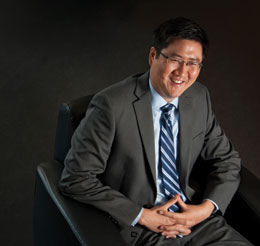Volume 30 · Number 4 · Summer 2013
The young and the inventive: Peter Lee

Peter Lee
(photo: Karin Higgins/UC Davis)
Peter Lee, professor of law
Education: J.D., Yale Law School, 2005; A.B. Harvard University, 1998
Specialty: Patent law and its impact on scientific and technological progress
Peter Lee seeks a better understanding of how scientific discoveries become new products: “My work focuses on the institutional and social context of innovation, the university-industry technology transfer.”
Universities such as UC Davis generate large numbers of patent-worthy inventions, and federal law allows the universities to take title to patents arising from federally funded research. This, in turn, allows universities to license new technology to the private sector, thus speeding the process of bringing products like new medicines to market. Traditionally, that combination of patent and license has been seen as being sufficient to lubricate the transfer of technology. Lee says that is no longer the case.
“Things are much more complicated than that,” he said. “You often need tacit knowledge to truly transfer and exploit the technologies.”
He believes there is an intangible, experiential, component to knowledge that can’t be conveyed solely through patent documents changing hands. There are rules of thumb that must be shared, along with all that paperwork: methods of approaching problems, of using raw materials, even “face time” between two experimenters.
Lee is working to formalize a more holistic process, making these rules of thumb as much a part of the technology transfer system as the paperwork of patents and licensing. He wants to create a campus network of what he calls “proof of concept centers” or “knowledge exchange centers.” They would be similar to the high-tech campuses set up at companies like Hewlett Packard and Google, but with ethical safeguards built in to limit how much consulting work professors can do for private companies, and how much equity they can hold in companies that are commercializing their technology.
“Universities can project their own norms into society,” Lee said. “There’s a two-way normative traffic between the university and the private sector.”
Back to The Young and the Inventive
